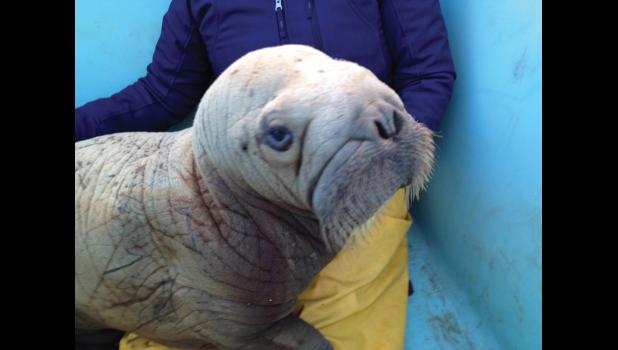Walrus calf found stranded on Nome gold dredge
A male Pacific walrus calf, missing its mother, crawled aboard the gold dredge AU Grabber off the coast of Nome on Wednesday, June 14.
When the 120-pound calf was still there the next morning, the AU Grabber crew called the Alaska SeaLife Center’s hotline and alerted the authorities about the gold barge’s unusual charge. From there, Marine Mammal Stranding Responder Gay Sheffield helped to coordinate the task to get the weak, tired and skinny walrus baby off the dredge.
She alerted co-management partners, the Eskimo Walrus Commission as well as Kawerak’s subsistence director.
Once at the harbor, the AU Grabber crew and Sheffield loaded the calf into a tote donated by Norton Sound Economic Development Corporation.
The calf was housed overnight in a secure location with constant monitoring and company, said Sheffield. Northern Air Cargo made every effort to transport the calf on the earliest available flight and by 8:30 a.m. Saturday morning the calf was airborne and headed to Anchorage.
The plane was met by veterinarians from the Alaska SeaLife Center and they provided medical care for the calf before transporting it to their facility in Seward. As of Monday, the walrus calf reportedly had some formula and rested.
ASLC President and CEO Tara Riemer said caretakers are “cautiously optimistic” about the walrus’ future but the baby is responding well to treatment.
The calf, which does not yet have a name, was very dehydrated and emaciated when it was turned in and has not responded to bottle-feeding. Currently the ASLC veterinarians are tube feeding the calf a diluted marine mammal formula along with antibiotics and other medications. It showed a few skin lacerations and the veterinarians are observing if other health issues surface.
Riemer noted that the ASLC, and the calf, are in somewhat uncharted territory—the center has never had a walrus so young before and walrus strandings are rare. “There’s not a lot for us to go on,” she said. The ASLC housed two walrus calves in 2012, but they were a several weeks older than this calf. A third walrus calf was transported to the center, but died shortly after arrival. However, there is no shortage of “substitute moms” for the calf, as volunteers are happy to take on four-hour shifts with the walrus.
Why the calf ended up alone on the barge is unclear. U.S. Fish and Wildlife Service Supervisory Marine Mammal Wildlife Biologist Jim MacCracken said he guesses that the walrus hauled out onto the barge to “take a nap.” He is unsure of how it got separated from its mother, but said that such a circumstance is not unheard of. “It’s not common, but it’s not unordinary,” said MacCracken, adding that the USFWS has gotten around three calls about stranded or orphaned walrus within a five-year period.
A walrus calf took a break on a gold dredge in 2014, but decided to abandon ship and return into the wild.
The fate of this walrus calf will be different as it will not be able to stay at the ALSC, because they do not have enough space for an adult male walrus, which can weigh between 2,500 and 4,000 pounds. Riemer said they are taking it one step at a time and have not yet found a permanent home for it. However, should the calf survive, it will remain in captivity for the rest of it’s life.
According to MacCracken, releasing the walrus back into the wild “would be a death sentence.”
Since it became separated from its mother at an early age, it is missing out on “learning how to be a walrus.” Typically, walrus calves stay with their mothers for two years, and do not reach adulthood until they are five to ten years old. Young walruses do not only rely on their parent for practical reasons; they are social animals that want attention. According to Sheffield, walrus calves respond to contact, such as voice and/or touch, and do not like to be left alone. “The calf was stressed and unhappy if left alone,” she said of her night with the walrus. Eventually the calf relaxed and slept heavily through the night, and upon waking at 5:00 a.m. the calf was more alert and vocal.
When people come across any distressed marine wildlife or walrus in the Bering Strait region, they should contact: Kawerak Subsistence Program, Brandon Ahmasuk (443-4265); UAF Alaska Sea Grant, Gay Sheffield 434-1149; Eskimo Walrus Commission, or the NMFS Marine Mammal Stranding Hotline (877) 925-7773.

